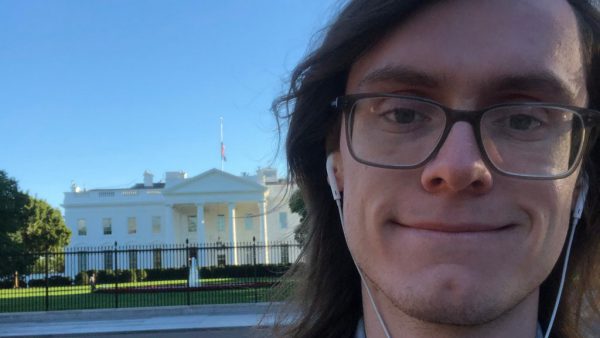
nonprofit organization that seeks to prevent sex trafficking while comforting and bringing
justice to victimized women and children.
A Kalamazoo College student is reflecting on an eye-opening internship opportunity that explored a global problem while providing experience that will benefit him in his life after K.
David Kent ‘22, a business and political science double major from Beverly Hills, Michigan, worked in Washington, D.C., at Shared Hope International this term. The nonprofit organization seeks to prevent sex trafficking while comforting and bringing justice to victimized women and children.
“I thought it would be a great opportunity to learn more about an important issue,” Kent said. “I learned that the practice of sex trafficking is rooted in human civilization. It’s been around as long as people have lived together in societies. It went hand in hand with the institution of slavery. But even now, as slavery is mostly illegal, it persists. I think there is a preconception that it only happens in back alleys and at night. But the reality is there are large operations that work in plain sight and they can sell to people who are well known and very influential. I learned that it can be anybody.”
Part of Kent’s opportunity was funded by the John Dingell Memorial Scholarship, which provides funds for students from Michigan colleges and universities while they participate in an internship. The internship itself was offered through Shared Hope International’s connection with the Washington Center, a group that unites college students with a variety of nonprofit organizations and other companies in the nation’s capital.
Kent worked at Shared Hope International as a policy and communications intern, meaning he was responsible for assisting the organization’s legal team with whatever it needed. Its biggest project involved issuing grades and report cards to each state based on its sex-trafficking laws. Kent served as a media relations contact as he connected with news professionals from around the country.
“It wasn’t necessarily a surprise, but I learned that Michigan is one of the worst states for trafficking with I-94 coming in from Detroit and going on through Chicago, and the state’s connections to Ohio, which is also one of the worst states because of its own highway system,” Kent said. “Michigan certainly has a lot to do in terms of getting laws on the books and enforcing them to better address the situation.”
In addition to the state report card project, Kent performed individual research on large-scale sex-trafficking operations before presenting to the organization’s staff on it. He also helped the organization prepare for a national conference conducted in Washington, D.C., that brought together activists, nonprofit organizations, policymakers, senators and survivors, while running a breakout session and funneling questions from virtual attendees to presenters.
Looking back, Kent said he has some ideas for how the world can fight sex trafficking.
“It starts with individual action,” he said. “Shared Hope International was founded by a former Congresswoman. It started with one person and that’s how we can advocate for such an organization—through one person at a time. These organizations always need volunteers, whether it’s donors contributing supplies or money, or volunteers for activities or shelters. You have to start there and work your way to bigger solutions.”
